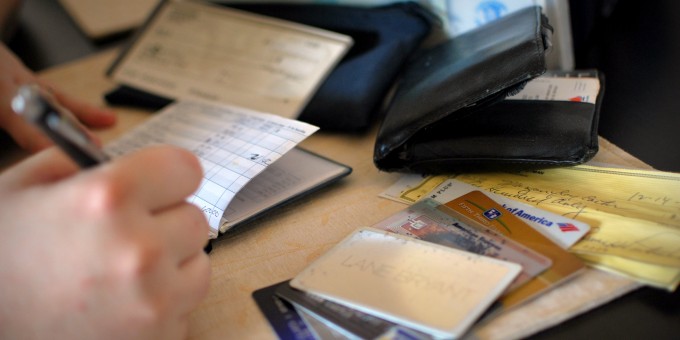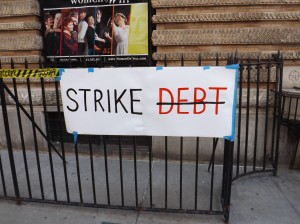
By now, it’s clear that in the United States and around the world, debt has come to shape people’s lives. Some use debt to get ahead, others buy debt to make a profit, and still others find their choices constrained by the weight of the debt they are dragging around. Andrew Ross, author of Creditocracy and the Case for Debt Refusal is convinced that finances have become modern shackles and that only an effective, equality based social movement can loosen those bonds.
Erin Hoekstra: What do you mean by “creditocracy”?
Andrew Ross: A creditocracy is a society in which the majority of people are so deeply in debt that it can never be repaid. Creditocracy emerges when the cost of access to social goods is privately debt binding for individuals. These social goods are not just things that improve quality of life, but basic requirements of life, including housing, education, healthcare, and even putting food on the table, which for many people requires going into debt. In this kind of society, our society, the creditor’s goal is to wrap debt around every single possible asset or income stream, ensuring a flow of interest. In a particularly advanced stage of a creditocracy, debtors have to seek out fresh sources of credit simply to service their existing debt. One of the bumper stickers I cite summarizes that condition: “I use MasterCard to pay Visa.” For the working poor, this has long been a familiar arrangement, but in recent decades, the position of permanent indebtedness has moved up into the higher reaches of social strata and now affects at least one, maybe two, generations of college educated middle class. That is the more advanced phase of creditocracy.
Hoekstra: You argue that our current system of debt and credit is holding Americans in a sort of “debt bondage.” How does it impact people’s lives on a daily basis?
Ross: Debt bondage is a very strong term, an inflammatory term for some, but it’s part of the revival of historical systems of and ways of talking about debt, including classic forms of debt bondage under feudalism, slavery, indenture, and all its successor institutions like share cropping and loan sharking. The legacy of all of those forms of debt bondage are very much alive and well on the subprime landscape of fringe finance. Pay day loan facilities, check cashing facilities, all of the poverty banks that operate on “loan alley” are increasingly making their way onto Main Street because they’re moving upscale. Debt bondage, something that has affected people on a daily basis in low-income communities, is moving up into the middle class. We’re also seeing a revival of talk about indenture, debt as a form of indenture, banking practices as an extreme form of usury, and increasing references to debt jubilees. This rhetoric belongs to the ancient and not-so-ancient past, but today debt extraction is a primary means of accumulation among the creditor class. This debt bondage has a very real psychological impact; individuals in debt feel it’s a life sentence that is foreclosing their future. In a very literal sense the more debt you take on, the more you are pledging the wages of the future to your creditor. That sense of the future being swallowed up is one of the most common psychological impacts of taking on a large debt load.
Hoekstra: The Occupy movement’s Rolling Jubilee project bought up and abolished personal debt. This “bailout of the people by the people” abolished $15 million of personal debt by spending only $400,000 to purchase that debt. How does that work?

Ross: The Rolling Jubilee is a project that I have been very involved in, a project of Strike Debt!, a debt resistance program that is an offshoot of Occupy. It’s a very simple idea: through crowdfunding, we raised a lot of money over a short time because people really like this idea. We used this money to buy distressed debt, which gets sold on the secondary debt marketplace. Banks and creditors are obliged to move nonperforming loans off their books in ninety days, and this distressed debt gets sold very, very cheaply – for pennies on the dollar – to debt buyers. These buyers then sell it on to collection agencies who come after you, the debtor, to try to collect the full amount of debt after having paid only a pittance for it. Our idea was buy some of this debt very cheaply. We decided to focus on medical debt, as no one should have to go into debt for becoming sick, and instead of collecting on the debt after we bought it, we simply abolished it or forgave it. We wrote to the debtors telling them that they’re off the hook. Initially, we were told that we would get a ratio of about 20 to 1. In other words, that for every dollar we spent, we could abolish $20 worth of debt. We managed to get 50 to 1 ratios for recent buys and have been able to stretch the dollars much further. For us it is a public education project, an opportunity to educate the public about the shadowy operations of the secondary debt market. Now, if your collection agent calls you up and you know that they pay very little money for the debt, you’re going to have a very different conversation with that collection agency. For other people, the sheer demonstration of the fact that you can abolish debt so simply, especially through a mutual aid project, was a real eye-opener. So it accomplished what we set out to do – to help out some people. Several thousand people’s debt was forgiven or abolished, but more importantly we educated the public about how the really shadowy, murky debt marketplace works.
Hoekstra: Morality and debt seem to deeply and historically intertwined that there’s a collective social sense that it’s unconscionable to avoid repayment. Your book seems to turn that on its head, saying it’s actually the current system of debt that’s immoral.
Ross: Yes, that is certainly something I urge in the book, to turn around these accusations and the moralism that the finance industry usually trains on debtors and point it at the finance industry itself. With evidence of wide spread predatory, deceitful, and fraudulent conduct of the big banks, we need to ask, “Who is really the delinquent agent on the debt landscape? Which entity is the moral hazard to society?” In most cases, it’s not the small debtor who cannot pay back debt. The delinquent one is the creditor who preys upon debtors, when it’s quite obvious they will never be able to pay back their debt, and who then lies and cheats in order to enforce repayments. “Payback morality” is one of the most effective instruments that the finance industry has for collecting profit, and this morality runs very deep. It’s been and still is considered taboo to think about not repaying your debt. However in the wake of the 2008 financial crash, a double standard was exposed. The big banks were really not expected to pay back their debts at all. They got government bailouts, while the small debtors were the ones still expected to pay back their debts. More and more people have become aware of this double standard, and as a result, payback moralism has eroded somewhat over the years.
Hoekstra: One of the goals of your book is to make a case for debt refusal, to call for a debtor’s movement. What would that look like? Are there alternatives to our current system of credit and debt?

Ross: We know there is an appetite out there for a debtors’ movement that has been actively building for a few years now, and we know that this movement is necessary because current levels of indebtedness are a threat to democracy. I wrote Creditocracy to provide some arguments for debt repudiation or debt refusal. The arguments draw very heavily from the Jubilee South Movement, a movement very active in the 1990s and 2000s that has tried, with some success, to get the external debts of developing countries forgiven or repudiated. My book, however, focuses on household debts in the Global North because the “debt trap” conditions that were imposed on developing countries in the 1960s and 70s have now moved into the North. The big shift we’ve seen in recent decades is that debt affects almost every consumer household in the North now. My book argues that the time is right to apply some of the arguments of the international Jubilee Movement to personal debt. A successful debtor’s movement has to figure out ways of threatening mass default on a collective basis in order to gain some leverage over the financial industry.
Hoekstra: Speaking of international debt movements, how does climate change and the climate justice movement fit in with this for you? How are discussions of debt and climate change linked?
Ross: The book tries to make a case for distinguishing between debts that are illegitimate and debts that are legitimate, which debts should be honored and which debts should be refused. Most climate debts should be honored. The most interesting thing is that the nature of climate debt reverses the typical structure of credit. [Countries in the Global] North are usually the creditors, and the Southern countries are the debtors. In this case, climate debt is the exact opposite. The rich countries are the debtors….

There are all sorts of ways to calculate these debts, most often measured against accumulated ecological debt from centuries of colonial extraction. One of the big challenges is to figure out how to get the rich countries to acknowledge their debt. They usually think of them in terms of aid and talk about them in terms of climate aid, rather than debt or reparations, which has different legal consequences. Let’s just say that they do acknowledge them, then how would the payments be distributed in an equitable fashion? This is one of the big challenges in the climate justice movement. Also, how do we ensure that the debt payments actually would get circulated and distributed to the people who need it most and are most affected? But climate debts in general are a complicated and complicating factor on the landscape of debt. Although I think we should be in the position of refusing a lot of debt, that is one that should be honored. We should figure out how our governments and also how the chief polluting industries and the high carbon beneficiaries should be held responsible for paying that debt.

Comments